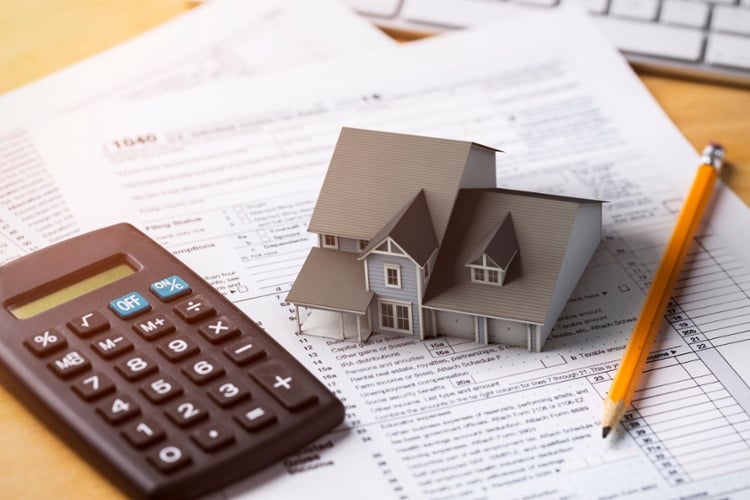Have you ever wondered why real estate is often referred to as a tax shelter?
Although most of us don’t like paying taxes, some real estate investors actually don't mind tax time. Tax law in the U.S. is very friendly to real estate investors. There are plenty of real estate tax deductions that allow you to legally reduce the amount of income tax paid.
Here, we’ll discuss how investors traditionally lower their rental income tax rate and taxable net income from a rental property.
Disclaimer: This is not tax advice. You should consult your own tax, legal and accounting advisors before engaging in any transaction.
How rental income tax works
A property that you own and rent to tenants for 15 days or more each year is considered a rental property by the Internal Revenue Service. Rental property is defined by the IRS as a single house, apartment, condominium, mobile home, vacation home, or similar dwelling.
Any net income your rental property generates is taxable as ordinary income on your tax return. For example, if your net rental income is $10,000 for the year and you fall into the 22% tax bracket, you would owe $2,200 in taxes.
That’s the short version of how rental income tax works. However, you’ve probably heard about real estate investors who own hundreds or even millions of dollars in real estate but pay next to nothing in taxes.
What they’re doing is perfectly legal. In fact, any rental property owner, including you, can own investment property that generates solid cash flow every month while reporting a loss on your tax return. All you have to do is follow the rules that the IRS has for renting out residential property.

How to calculate rental income and expenses
Let’s start with the income side of the equation. There are several types of rental income your property could have:
- Normal rent payments
- Advanced rent payments (such as first and last month)
- Extra monthly rent including pet fees, parking, or appliance rental fees
- One-time fees or a penalty for canceling a lease
- Expenses paid by the tenant in lieu of rent, such as landscaping that you would normally hire a vendor to do
- A portion of the security deposit you don’t return to the tenant, for example, to pay for damage caused by the tenant
A refundable security deposit isn’t treated as income because you intend to return it to the tenant at the end of the lease. Instead, it appears on your rental property balance sheet as a short-term liability. However, if the tenant doesn’t live up to the terms of the lease and you keep all or part of the security deposit, it becomes rental income in that tax year.
Now let’s look at some of the most common expense deductions related to your rental property that you can subtract from all of the income you’ve collected during the tax year:
- Cleaning, repair, and maintenance costs
- Property management and leasing fees
- Landscaping fees
- Utility services such as water, trash, or pest control
- Insurance costs
- Mortgage interest
- Rental or sales taxes
- Property taxes
- HOA or condominium dues
- Legal and professional fees such as your accountant or attorney
The next step is to subtract all of your expenses from the income you’ve collected to arrive at your taxable income before depreciation.
For example, if you collected $18,000 per year in gross income and the expenses related to owning and operating the property are $8,000 for the year, your taxable income before depreciation is $10,000.
However, there’s another rental property tax deduction you can take to lower your amount of taxable net income.
Deducting depreciation
Depreciation is a non-cash expense you can deduct from your net income as compensation for your rental property depreciating or wearing out. IRS Publication 946 provides a detailed explanation of how rental property depreciation works. For the purposes of this example, we’ll simplify things.
The IRS allows you to depreciate residential rental property over 27.5 years. So, if you paid $125,000 for a single-family rental home and the land is worth $25,000 your depreciation deduction is $3,636.36 per year ($100,000 / 27.5 years). The value of the land isn’t counted as depreciation, because land never wears out.
By deducting the depreciation expense of $3,636.36 from taxable income before depreciation of $10,000, the taxable income after depreciation is $6,363.64.
Instead of paying $2,200 in taxes, you would now pay $1,400, assuming the same tax bracket rate of 22%. That means you just saved $800 in taxes thanks to the depreciation expense, giving you more money to reinvest in real estate.
Qualified business income deduction
Qualified business income deduction (QBI), also known as a Section 199A or pass-through income deduction, is another tax break real estate investors can take.
The QBI deduction allows an additional deduction of up to 20% of qualified pass-through business income after you’ve deducted all of your property operating and ownership expenses, and depreciation. Owners of sole proprietorships, partnerships, S corporations, and some trusts and estates may be eligible for the qualified business income deduction.
Rules for taking the QBI deduction can be complicated, so be sure to read what the IRS says about QBI or consult your tax advisor to make sure you’re getting all of the deductions you’re entitled to.
Rental income tax calculation example
Finally, let’s look at a detailed example of how to calculate rental income tax. We’ll leave QBI out of this example because not every investor qualifies for an additional pass-through income deduction.
Income and property purchase
- Purchased rental property for $125,000 on January 1
- Paid $1,500 for title insurance and recording fees as non-deductible expenses
- Value of the lot (land) is $25,000
- Rental income is $1,500 per month
- Property basis used for depreciation = $101,500 (Purchase price of $125,000 + $1,500 non-deductible expenses - $25,000 lot value)
- Total annual rental income = $18,000
Operating expenses and ownership costs
- $1,200 for cleaning, repair, and maintenance costs
- $1,440 for property management and leasing fees
- $600 in landscaping fees
- $100 for pest control with the tenant paying all other utilities
- $960 property and landlord liability insurance costs
- $2,640 in mortgage interest payments
- $1,200 for property taxes
- $500 tax preparation fee paid to your accountant
- $1,200 travel costs directly related to visiting your out-of-town property
- Total annual deductible expenses = $9,840 per year
Calculating the rental income tax
- Step 1: Subtract total deductible expenses of $9,840 from your total annual rental income of $18,000 = $8,160 net income before depreciation.
- Step 2: Calculate depreciation - $101,500 property basis / 27.5 years = $3,691 annual depreciation expense.
- Step 3: Calculate taxable income - $8,160 net income before depreciation - $3,691 annual depreciation expense = $4,469 taxable income.
- Step 4: Calculate rental income tax - $4,469 x 22% (married filing jointly with income between $80,251 and $171,050) = $983.
How to report rental income on your tax return
Real estate investors report income or loss from rental real estate, partnerships, S corporations, estates, and trusts using Schedule E: Supplemental Income and Loss, Form 1040 or 1040-SR. You will also need Form 4562 to report your depreciation expense or depletion.
Schedule E has room for 3 properties. As you scale up your rental property business you may eventually have more than 3 rentals. When you get to that point you can file an additional Schedule E form when you have more than three.
It’s important to provide the IRS with accurate information, so be sure to keep records for your property including rent checks, expense receipts, and financial statements. Your property manager will provide you with a year-end profit and loss statement you can use for tax purposes.
Always review the P&L report and include any additional expenses your manager may not be aware of, such as tax planning fees you paid that relate to your investment, or travel expenses relating to your property.
The more accurate the records you keep, the better you’ll be able to claim every deduction you’re entitled to and avoid paying additional taxes or penalties. If you are ever audited, having accurate detailed records demonstrates to the IRS that you are running your real estate business professionally.
Keeping accurate financials for each property has traditionally been a headache, but tools like Stessa are making it much easier.
Taxes and management made easy with Stessa
Stessa helps streamline the record-keeping process so you can stay organized, maximize your tax deductions, and make informed decisions. Trusted by over 250,000 landlords, Stessa is designed to help you maximize your profits while eliminating the busywork traditionally associated with managing rental properties.
You also get features that make the day-to-day management of your properties easier, including:
- Automated income and expense tracking: Instantly sort and classify transactions from linked bank, lender, credit card, and property management accounts, all without additional fees or required add-ons.
- Financial reporting: Generate income statements, net cash flow summaries, and balance sheets (available with the paid Pro plan), among other reports.
- Landlord banking: Open an FDIC-insured high-yield bank account* for each property and easily integrate them with Stessa’s financial tracking features.
- Rental applications and tenant screening: Use Stessa’s tenant screening services and free rental applications to find and select qualified tenants.
- eSigning (in partnership with DocuSign): Upload your document, tag it for digital signatures, and send it to tenants, vendors, partners, and others.
- Free rent collection: Collect rent from tenants through one-time or recurring ACH payments.
- Real-time performance metrics: Get round-the-clock insights into the performance of your property portfolio.
- Property management integration: Link your property management data portal to Stessa to import transactions and get a detailed portfolio overview.
- Unlimited properties: Add an unlimited number of properties to your Stessa account.
- Collaborative access: Invite other investors, CPAs, spouses, and others to share your Stessa account. Manage their access levels to view and/or edit the account.
- Tax resources: Access the yearly Tax Guide and a suite of educational materials created in partnership with The Real Estate CPA to make tax season a breeze.
Experience a more efficient, stress-free way to manage your rental properties. Sign up for a free account with Stessa today.










